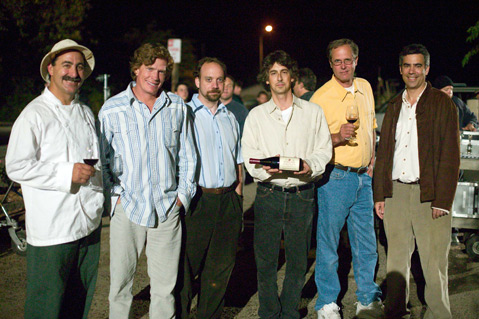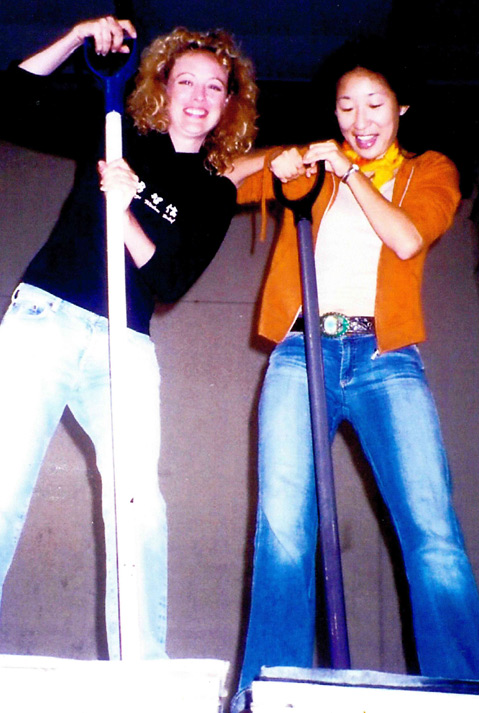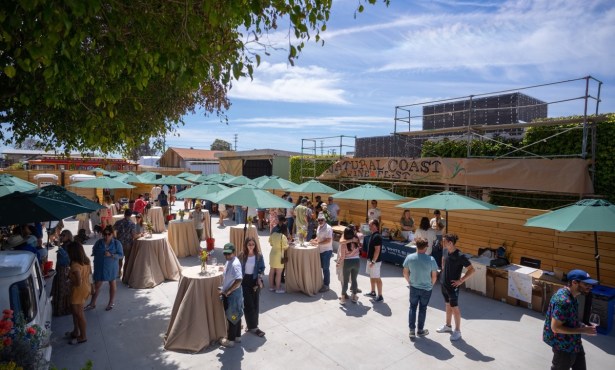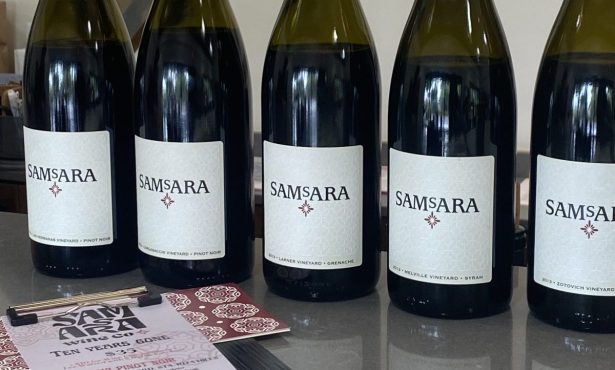Remembering the Sideways Days
Vintners, Restaurateurs Reflect on Making and Effect of Award-Winning Wine Country Film

When it premiered in 2004, the film Sideways put Santa Barbara wine country on the global tourism map, boosting sales of the protagonists’ beloved pinot noir and bringing an unending stream of sipping and sightseeing visitors to the Santa Ynez Valley. In this 10th-anniversary year, the continuing effects will get a boost on Sunday, October 5, with a free 3 p.m. screening of the film at the Arlington Theatre with director Alexander Payne. We asked a handful of folks on the frontlines of the movie’s making to reflect on those Sideways days.
Frank Ostini, winemaker, chef, owner of the Hitching Post II: The writer, Rex Pickett, would hang out at the restaurant, and we all knew he was writing a book. I just figured it was never going to be published. Then he said he sold it as a screenplay instead of a book in 1998. I’d never heard of that. It wasn’t until 2003 that the location scouts came.
Billy Wathen, winemaker/co-owner, Foxen Winery: Rex liked his sauce. He loved to come up and just drink pinot noir, and we’re talking bottles, not glasses.
Martin Brown, co-owner/winemaker, Kalyra: We were rebuilding the tasting room, and when they came to look at the site, the director asked, “Can I film in here? I’ve got a set design crew with nothing to do and money to spend. Why don’t we come in and finish it for you?” I said, “That sounds like a great idea!” Within eight days, they rebuilt our entire tasting room. It was probably like $40,000 of work. By the time they started filming, we were way, way ahead.
Tim Snider, president, Fess Parker Winery: When they sent over the script for us to review our scene, their parting words were, “Don’t worry — we won’t have your brand name exposed. We’ll hide it completely for the scene.” I hung up and then thought, “Wait a minute, why would I want our brand name hidden?” When the script came, I read it, and said, “Aha.” He took the script to [his wife] Ashley Parker and [brother-in-law] Eli Parker, described the situation that it was a fanciful winery called Frass Canyon that they disparage in the movie, but that our name’s not there. It seemed like an interesting opportunity for Santa Barbara wine country that would probably do more good than bad. So we pulled the trigger.
Sam Marmorstein, owner of Los Olivos Wine Merchant & Café: I wasn’t really interested in doing it, so I gave the location scout a high location price. They wanted to knock some money off in exchange for showing off one of the Bernat labels I make in the movie. I stuck to my guns and said, “I don’t make that much wine, I don’t need to do that. I’ll just take the money.” That was obviously a big mistake.

FO: I was afraid that they were gonna make fun of us. I sent an impassioned letter to the director asking for a meeting because I was worried that it would show wine in an abusive way. He admitted that it would but that he understood drug abuse and that there are all forms of alcoholism. I thought, “This guy is interesting. He has sensibilities.” I was playing the high road [about how wine is enjoyed], and I had to learn it was not always that way. They were extremely respectful of us.”
BW: They asked if we wanted to be paid, but we said no. They dissembled our tasting room and set it up the way they wanted. There were probably 150 people here at the shack with three food wagons. My pruning crew was probably the first ones at the food wagon. I was just amazed at how many blue-collar people were running this thing. They got this big dressing room trailer stuck coming out of the driveway. Traffic was impassable for a while.
MB: I could go outside and sit on a bench with Thomas Haden Church and Paul Giamatti and have a glass of wine. They were really approachable, relaxed, and casual. They treated our place like a clubhouse, even coming back on the days they weren’t filming there. My brother and I ate for free in the tasting van. We added a meal between lunch and dinner to eat more. We were having filet mignon for breakfast and lobster for lunch. It was like icing on top of icing.
SM: When filming the double-date scene, it was so noisy because we had all our refrigerators and machines going. So someone went in the back and shut off all the breakers. My computer crashed, and I lost the whole system. They were nice enough to take the computer to a guy in L.A., fix it up, and get it back here in 24 hours. That was scary.
TM: It didn’t dawn on me that he was actually going to drink the spit bucket. I was watching from the upper walkway of the winery, and Paul Giamatti was hustling back and forth and then basically dumped it all over himself. Having been to many big consumer tastings and seen the dump buckets, it sent shivers down my spine, even though I knew it was grape juice.
FO: By the time they came to the Hitching Post, they were a couple weeks into the shoot, and they didn’t want to drink grape juice anymore. So they were drinking wine on the set. We also put on wine tastings at night. There were six people the first night, then 20 the next night. On the last night, we had a barbecue. Everyone stayed ’til like two in the morning, then they went to an after-after-party.
BW: We extended a discount to the whole filming crew, so we had a lot of visitors all the time. When they were done shooting, they’d come back and drink wine. We got to know a lot of them. I’d run into Paul Giamatti at El Rancho Market and talk baseball. He’s a real down-to-earth kind of normal guy who is a great actor.
FO: They had no money to market the movie, so I just figured it wasn’t going anywhere. We went to the premiere at the Arlington in September, toward the end of harvest. I walked out, and I was in shock at how much we were featured. You couldn’t pay a company to do that for you, and we didn’t pay anything. I still didn’t think anyone was going to see it, but I realized that I needed to put our yellow sign on our website. I hated the color but could never afford to change it. Then I went to see it at the Lincoln Center during the New York Film Festival and sat on a balcony looking down on about 2,500 people. They were literally rolling in the aisles.
SM: All of a sudden, we’re getting these big crowds coming in, and we’re like, “What’s going on?” We had to hire more staff. People were coming to Los Olivos slowly, but then the movie hit, and the floodgates opened. Everybody started coming. It reached a certain plateau and stayed there.
BW: We had no idea. Our traffic more than doubled, and we had to hire more people. It just got crazy, and it’s never been the same since. It was phenomenal.
FO: We had to figure out how to do 30 percent, 40 percent more business. That went on for two to three years. I had to remember the values instilled by my parents about the hospitality and the quality of the food. I would focus on that during the busiest of times. The movie is going to come and go, but we can’t forget what’s important.
MB: People would come in, and they didn’t even like wine. They were just on the tour. Then the Michael Jackson trial was in Santa Maria, and all the journalists in town had nothing else to do but go out to the wineries.
TS: We ended up getting a ton of positive media coverage on the heels of it, and it usually went like this: Fess Parker Winery, which was disparaged in the movie as Frass Canyon, is actually a family-owned winery and a producer of fantastic pinot noir, chardonnay, and so on. We had this pilgrimage of people coming to the tasting room and wanting to see the corner of the bar where the dump bucket was. Fortunately, no one actually drank the dump bucket, but a lot of people would pick it up and have their friend take a picture. We ended up selling through nearly three vintages of pinot noir in the time it would normally take to sell one. Sales went berserk.
FO: I eventually came to the understanding that the movie is going to outlive all of us. In 100 years, people will look at the scenes when they talk about wine and how it’s alive and about the people who pick the grapes, and they’ll be able to understand what we’re doing. To me, that’s immortality and that’s the most valuable thing from Sideways. It’s a gift that you never expect to have. I am very grateful. I’ll do anything for these people.



